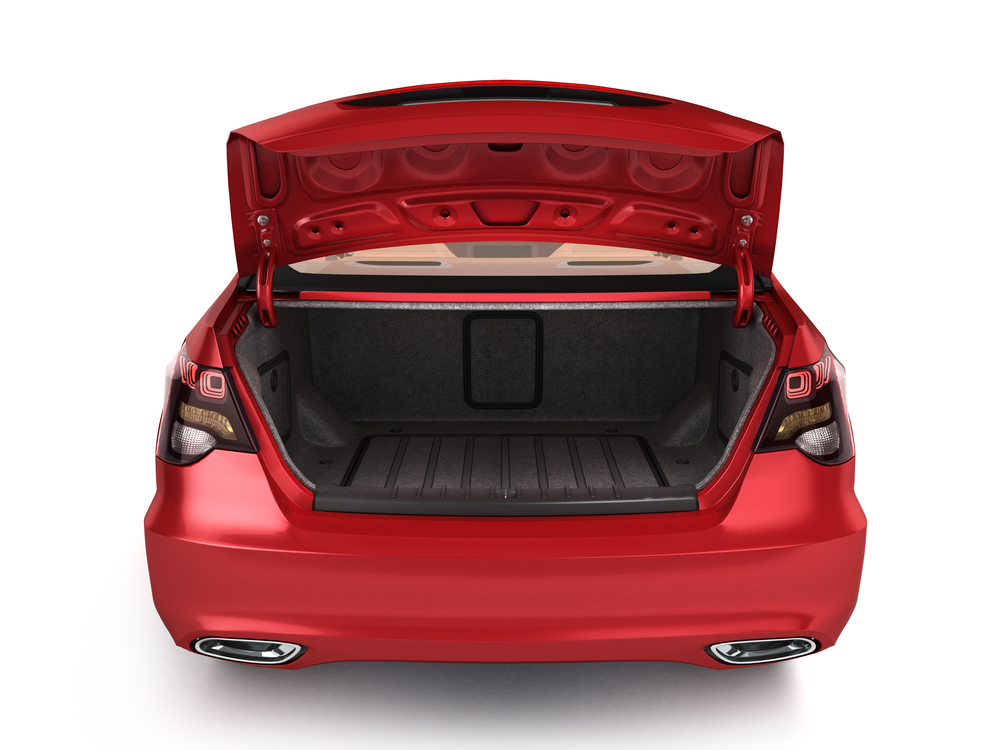No. Just smelling marijuana coming from the car is not alone enough justification for a warrantless search of the trunk in Ohio.
The Ohio Supreme Court in State v. Moore, 90 Ohio St.3d 47 (2000) found that if an officer smells marijuana during a traffic stop coming from a car, he can search the passenger compartment of the car without a warrant.
This warrantless search, however, does NOT extend to the trunk of a vehicle. State v. Adams, 2015-Ohio-5072, FN 4.
A trunk and a passenger compartment of a vehicle are subject to different standards of probable cause to conduct searches.
The odor of burnt marijuana in the passenger compartment of a vehicle does not, standing alone, establish probable cause for a warrantless search of the trunk of the vehicle.

Marijuana Evidence Found in Trunk of Car Inadmissible at Trial
Man Pulled Over for Speeding, Officer Smelled Marijuana, Searched Trunk
This issue came up in an Ohio Supreme Court case – State v. Farris, 109 Ohio St.3d 519, 2006-Ohio-3255.
In that case, a trooper stopped a car for speeding. When the driver lowered the passenger window, the trooper smelled a light odor of burnt marijuana coming from inside the car. The officer had not observed the driver smoking, nor did he see him throw anything out a window.
The officer asked the driver to step out of the car. He did not conduct a field sobriety test, but did conduct a pat-down search and found no evidence of contraband or drugs.
The officer took the driver’s car keys and asked him to sit in the front seat of the police cruiser. While they were seated in the front of the cruiser, the officer told the driver that he had smelled marijuana in the car.
Without administering a Miranda warning or seeking consent to search the car, the officer asked about the smell of marijuana. The driver said that his housemates had been smoking marijuana when he left the house.
The officer said he was going to search the car and then specifically asked whether there were any drugs or drug devices in the car. The driver admitted that there was a “bowl,” i.e., a marijuana pipe, in a bag in his trunk.
The officer testified that after the driver made those statements, he immediately administered Miranda warnings, but did not tell the driver that his previous admissions could not be used against him.
He then asked the driver the same questions and obtained the same responses regarding the location of the drug paraphernalia.
The officer and a second trooper searched the interior of the car and found nothing. They then opened the trunk, searched it, and seized a closed, opaque container that held a glass pipe and cigarette papers.
The driver was charged with a misdemeanor for possession of drug paraphernalia.
All Evidence of Marijuana Found in the Trunk Was Excluded from Evidence at Trial
First, the successive questioning by the officer – first without Miranda warnings and then with Miranda – was found to be unconstitutional. Thus, the post-Miranda admissions by the driver about marijuana in the trunk were inadmissible.
Without that admission, the prosecutor argued that the officer still had probable cause based solely on the smell of marijuana coming from the car.
But the officer detected only a light odor of marijuana, and the trooper found no other contraband within the passenger compartment. Simply smelling marijuana is not enough to justify a search of the trunk.
The trooper thus lacked probable cause to search the trunk. All marijuana evidence was excluded in court.
If you have been charged with marijuana possession in Columbus and have questions about the search involved in your case, talk to one of our Columbus marijuana attorneys – (614) 361-2804. Free consultation.


